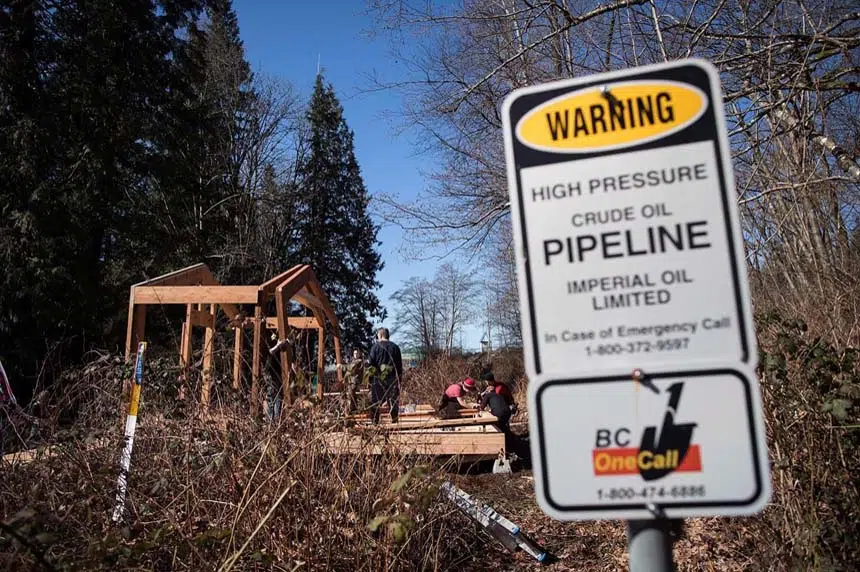By Camille Bains, The Canadian Press
VANCOUVER — Protesters must be restrained from obstructing the expansion of the Trans Mountain pipeline, says a British Columbia Supreme Court judge who has granted the company an injunction aimed at preventing people from entering within five metres of two work sites.
Justice Kenneth Affleck said Thursday he felt it necessary to make a decision on the second day of a hearing instead of issuing a written order involving outraged demonstrators who have blocked vehicles and workers at the Burnaby Terminal and the Westridge Marine Terminal.
The injunction is indefinite, allowing Trans Mountain to continue work it’s legally entitled to do after the federal government approved the twinning of an existing pipeline from Edmonton to Burnaby in the belief it is in the best interest of Canada, Affleck said.
Trans Mountain has said that while protests began last November, it sought an injunction after demonstrators began intensifying their blockades recently when trees were being cleared. It said construction at the sites in Burnaby, B.C., is expected to last until December 2020.
Affleck agreed with lawyers for two of 15 named defendants in a notice of civil claim that a 50-metre perimeter as part of an interim injunction he granted last week was too broad because it encroached on private property and trails.
Trans Mountain’s lawyer, Shaun Parker, requested a structure called Camp Cloud near the Burnaby Terminal be removed, calling it a “hotbed of aggressive activity” for protesters who want to “destroy the project.”
But the judge said it will stay.
“In my view there has to be a means of allowing the protesters who object to this work to remain reasonably close to the site,” Affleck said. “The plaintiff is going to have to tolerate a certain amount of agitation.”
Parker was also unsuccessful in his request for an order requiring the removal of a structure called the Watch House, saying it’s on a pipeline right of way and would cause significant safety risks.
“I’m sensitive to the concern of those who created this Watch House, that it is of considerable significance to them,” Affleck said of the structure that was erected near the Burnaby Terminal on Saturday, when people marched against the pipeline.
He said Trans Mountain would have to demonstrate any emergency need to remove the Watch House but would then have to replace it.
Casey Leggett, a lawyer for one of the defendants, said citizens have a constitutional right to protest the expansion of the pipeline.
“The inconvenience, which my friends call a blockade, hasn’t gotten to the level of establishing irreparable harm,” Leggett said.
He read from affidavits presented in court by a Trans Mountain lawyer, saying the company’s security staff noted protesters have sometimes stood peacefully at or near access roads to two marine terminals in Burnaby without disrupting vehicles or workers and left after police arrived.
He said in one case, a woman was seen praying on a road and didn’t engage with security staff while on another day a woman sat in a lawn chair as vehicles were guided around her at slow speed.
Affleck said while the first protesters’ conduct was unobjectionable, the second woman had no right to sit in the middle of a public road and the police would be justified in removing her.
The judge also suggested Leggett was cherry-picking incidents that did not involve blockades aimed at stopping work at the terminals.
Leggett replied that Trans Mountain had done the same and also focused on blockades rather than inconvenience, which he said does not justify an injunction.
Activists have said they will continue opposing the $7.4-billion project despite the injunction.







